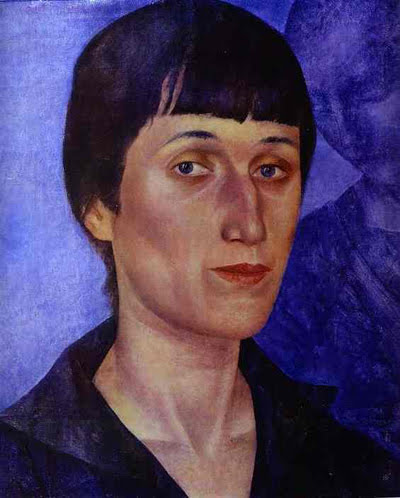
Anna Akhmatova
June 23: Born Anna Andreyevna Gorenko in Bolshoy Fontan, near Odessa, Ukraine, Russian Empire.
Begins writing poetry.
Marries Nikolay Gumilyov
With Gumilyov, forms the Akmeists, who attempt to disperse the atmosphere of "irrationality," the vagueness, and the affectations of Symbolism, freeing poetry from its "mystical fog." The Akmeists seek a "beautiful clarity," compactness, simplicity, and perfection of form. They accept all sensuous aspects of the world: sight, sound, smell, touch, and taste. In their works, the Akmeists characteristically develop the theme of the relationships between Russia's past, present, and future.
Vecher (Evening) is published.
Chyotki (Rosary) is published.
Belaya staya (The White Flock) is published.
Divorces Gumilyov.
Podorozhnik (Plantain) is published.
Gumilyov is executed by the State.
Official Soviet critics proclaim her "bourgeois and aristocratic," condemning her poetry for its narrow preoccupation with love and God, and characterizing her as half nun and half harlot.
Anno Domini MCMXXI is published.
Enters a period of almost complete poetic silence and literary ostracism (no volume of her poetry is published in the Soviet Union until 1940).
Begins composing "Rekviem" ("Requiem"), composed between 1935 and 1940 and occasioned by AA's grief over the arrest and imprisonment of her son, Lev Gumilyov, in 1937.
She writes and revises it in secret, and at one point is even afraid to keep a manuscript. She writes down fragments for her friends, who memorize them, then burn them. "It was like a ritual," her friend Lydia Chukovskay later recalled. "Hands, matches, an ashtray. A ritual beautiful and bitter."
Several of her poems are published in the literary monthly Zvezda (The Star).
A volume of selections from her earlier work appears under the title Iz shesti knig (From Six Books). A few months later, however, it is abruptly withdrawn from sale and libraries.
September: Following the German invasion, AA is permitted to deliver an inspiring radio address to the women of Leningrad [St. Petersburg]. Evacuated to Tashkent soon thereafter, she reads her poems to hospitalized soldiers and publishes a number of war-inspired lyrics.
Returns to Leningrad.
August: AA is harshly denounced by the Central Committee of the Communist Party for her "eroticism, mysticism, and political indifference." Her poetry is castigated is "alien to the Soviet people," and she is again described as a "harlot-nun," this time by the director of Stalin's program of cultural restriction. She is expelled from the Union of Soviet Writers; an unreleased book of her poems, already in print, is destroyed; and none of her work appears in print for three years.
A number of her poems eulogizing Stalin and Soviet communism are printed in several issues of the illustrated weekly magazine Ogonyok (The Little Light) under the title "Iz tsikla 'Slava miru'" ("From the Cycle 'Glory to Peace'"). This uncharacteristic capitulation to the Soviet dictator — in one of the poems AA declares: "Where Stalin is, there is Freedom, Peace, and the grandeur of the earth" — was motivated by her desire to propitiate Stalin and win the freedom of her son, Lev Gumilyov, who had been arrested again in 1949 and exiled to Siberia.
A slim volume of her lyrics, including some of her translations, is published. After 1958 a number of editions of her works, including some of her brilliant essays on Pushkin, were published in the Soviet Union (1961, 1965, two in 1976, 1977); none of these, however, contains the complete corpus of her literary productivity.
Awarded the Etna-Taormina prize in Italy.
Receives an honorary doctoral degree from Oxford University.
March 6: AA dies in St. Petersburg. She is interred at Komarovo Cemetery.
Akhmatova's longest work, Poema bez geroya (Poem Without a Hero), on which she worked from 1940 to 1962, is published in the Soviet Union.
Rekviem published in Moscow.
But the list has been confiscated and is nowhere to be found.
I have woven a wide mantle for them
From their meager, overheard words.
I will remember them always and everywhere,
I will never forget them no matter what comes.
Anna Andreevna Akhmatova used poetry to give voice to the struggles and deepest yearnings of the Russian people, for whom she remains the greatest of literary heroines. She has lately come to symbolize for the world even beyond Russia the power of art to survive and transcend the terrors of our century. — Judith Hemschemeyer, A Stranger to Heaven and Earth (1993).